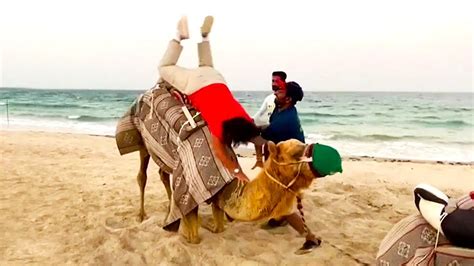
Unexpected travel mishaps can quickly turn a dream vacation into a frustrating ordeal, as evidenced by numerous accounts of trips derailed by unforeseen circumstances, ranging from severe weather and lost luggage to health emergencies and accommodation nightmares. A recent compilation highlights 31 such vacation disasters, illustrating the potential pitfalls that travelers can encounter and underscoring the importance of thorough preparation and flexible planning.
Dream Vacations Turn Sour: 31 Tales of Travel Woes
A compilation of travel stories reveals how quickly idyllic getaways can devolve into frustrating, and sometimes dangerous, experiences. From natural disasters and travel snafus to health scares and accommodation issues, the incidents highlight the unpredictable nature of travel and the importance of being prepared for the unexpected. The shared experiences serve as cautionary tales for vacationers, emphasizing the need for comprehensive travel insurance, flexible itineraries, and a proactive approach to problem-solving.
The featured vacation fails encompass a wide array of scenarios. Several travelers recount experiences with extreme weather, including hurricanes that forced evacuations and blizzards that caused extensive delays and stranded them far from home. Others describe logistical nightmares, such as lost or delayed luggage containing essential medications or clothing, missed connecting flights due to airline errors, and rental car mishaps. Accommodation problems also feature prominently, with travelers arriving to find misrepresented properties, unsanitary conditions, or outright fraudulent listings.
Health emergencies represent another significant category of vacation disasters. Travelers recount stories of sudden illnesses, accidental injuries, and even encounters with dangerous wildlife that required immediate medical attention, leading to costly hospital bills and disrupted travel plans. Theft and scams also marred several vacations, with travelers reporting incidents of pickpocketing, fraudulent tour operators, and compromised credit cards.
The diverse range of incidents underscores the importance of proactive planning and preparedness. While it is impossible to anticipate every potential problem, travelers can mitigate risks by purchasing comprehensive travel insurance, packing essential medications and supplies, researching their destinations thoroughly, and maintaining open communication with their travel providers. Having backup plans and a flexible mindset can also help travelers navigate unexpected challenges and minimize the impact of travel disruptions.
Specific Examples of Vacation Nightmares
The 31 recounted vacation fails provide a detailed look into the various ways a trip can go wrong. A couple planning a romantic getaway to the Caribbean saw their dreams dashed when a hurricane struck, forcing them to evacuate their resort and spend several days in a crowded shelter. A family traveling to Europe for a long-awaited reunion experienced a logistical nightmare when their luggage was lost, containing essential medications for a child with a chronic condition. A solo traveler in Southeast Asia contracted a severe foodborne illness, requiring hospitalization and leading to significant medical expenses.
One traveler described arriving at a rental property only to find it was nothing like the photos online. “The listing showed a luxurious villa with a private pool,” they said. “But when we arrived, it was a rundown shack with no pool and a leaking roof.” Another traveler recounted a terrifying encounter with a venomous snake while hiking in a national park. “I was bitten on the ankle,” they said. “And had to be airlifted to the nearest hospital for treatment.”
Several travelers reported being victims of theft or scams. One family had their wallets stolen while visiting a crowded tourist attraction, losing cash, credit cards, and identification. Another traveler booked a tour through an online agency only to discover upon arrival that the company was fraudulent and their money was gone.
These are just a few examples of the many vacation disasters recounted in the compilation. While the specific details vary, the underlying theme remains the same: travel is inherently unpredictable, and even the most meticulously planned trip can be derailed by unforeseen circumstances.
The Importance of Travel Insurance
Many of the travelers who experienced vacation disasters emphasized the importance of having comprehensive travel insurance. Travel insurance can provide coverage for a wide range of potential problems, including trip cancellations, medical emergencies, lost luggage, and travel delays. Depending on the policy, travel insurance may also cover expenses related to evacuation, repatriation, and legal assistance.
“Travel insurance saved us thousands of dollars,” said one traveler whose trip was canceled due to a family emergency. “We were able to recoup the cost of our flights, hotels, and tours.” Another traveler who required emergency medical treatment overseas said that their travel insurance covered all of their medical expenses, as well as the cost of flying a family member to be with them.
Not all travel insurance policies are created equal. It is important to carefully review the terms and conditions of a policy before purchasing it to ensure that it provides adequate coverage for the specific risks associated with your trip. Some policies may exclude coverage for certain activities, such as extreme sports or travel to certain destinations. Others may have limitations on the amount of coverage they provide for medical expenses or lost luggage.
Tips for Avoiding Vacation Disasters
While it is impossible to guarantee that your vacation will be problem-free, there are several steps you can take to minimize the risk of encountering travel disasters. These include:
- Research your destination thoroughly: Before you book your trip, take the time to research your destination and learn about any potential risks or challenges. Check for travel advisories issued by your government and read reviews from other travelers.
- Purchase comprehensive travel insurance: As mentioned above, travel insurance can provide valuable protection against a wide range of potential problems. Make sure your policy provides adequate coverage for your specific needs and destination.
- Pack essential medications and supplies: If you take any prescription medications, be sure to pack enough to last for the duration of your trip, plus a few extra days in case of delays. Also, pack a basic first-aid kit with essentials such as bandages, pain relievers, and antiseptic wipes.
- Make copies of important documents: Before you leave home, make copies of your passport, driver’s license, credit cards, and other important documents. Store the copies separately from the originals, in case of theft or loss.
- Inform your bank and credit card companies of your travel plans: This will help prevent your cards from being blocked due to suspected fraud.
- Be aware of your surroundings: Pay attention to your surroundings and be cautious of potential scams or petty theft. Avoid walking alone in unfamiliar areas at night and keep your valuables secure.
- Stay connected: Make sure you have a reliable way to communicate with family and friends back home. Consider purchasing a local SIM card or using a mobile Wi-Fi hotspot.
- Be flexible: Things don’t always go according to plan when traveling. Be prepared to adapt to unexpected changes and have backup plans in place.
- Trust your instincts: If something feels wrong, it probably is. Don’t be afraid to trust your instincts and remove yourself from potentially dangerous situations.
- Keep emergency contact information handy: Have a list of emergency contact numbers, including your embassy or consulate, local police, and your insurance provider.
- Monitor weather conditions: Stay informed about weather forecasts for your destination and be prepared to adjust your plans if necessary.
- Learn basic phrases in the local language: Knowing a few basic phrases can be helpful in navigating unfamiliar situations and communicating with locals.
- Avoid excessive alcohol consumption: Alcohol can impair your judgment and make you more vulnerable to scams and accidents.
- Be respectful of local customs and traditions: Dress modestly when visiting religious sites and avoid behavior that could be considered offensive.
- Leave valuables at home: Avoid bringing expensive jewelry or other valuable items on your trip.
- Use reputable transportation services: When taking taxis or other transportation services, make sure they are licensed and reputable.
- Avoid drinking tap water in countries where it is not safe: Drink bottled water or use a water filter.
- Be careful when trying new foods: Introduce new foods gradually and avoid eating food from street vendors that looks unsanitary.
- Get necessary vaccinations and health advice: Consult with your doctor or a travel clinic before your trip to ensure you have all the necessary vaccinations and health advice.
- Share your itinerary with someone: Let a friend or family member know your travel plans, including your itinerary and contact information.
By taking these precautions, you can significantly reduce your risk of encountering vacation disasters and ensure a more enjoyable and stress-free travel experience.
The Psychological Impact of Travel Mishaps
Beyond the financial and logistical challenges, vacation disasters can also have a significant psychological impact on travelers. The stress of dealing with unexpected problems, such as lost luggage, medical emergencies, or travel delays, can lead to anxiety, frustration, and even depression. The disappointment of having a long-awaited vacation ruined can also be difficult to cope with.
Some travelers may experience post-traumatic stress symptoms after a particularly traumatic travel experience, such as a natural disaster or a violent crime. These symptoms can include flashbacks, nightmares, and avoidance of travel.
It is important to acknowledge the psychological impact of travel mishaps and seek support if needed. Talking to a therapist or counselor can help travelers process their experiences and develop coping mechanisms. Joining a support group or connecting with other travelers who have experienced similar problems can also be helpful.
The Future of Travel: Adapting to Uncertainty
The increasing frequency of extreme weather events, political instability, and other global challenges has made travel more unpredictable than ever before. As a result, travelers need to be prepared to adapt to uncertainty and embrace a more flexible approach to planning.
This may involve choosing destinations that are less vulnerable to natural disasters, purchasing travel insurance that provides comprehensive coverage for unforeseen events, and being willing to change plans at the last minute if necessary.
Travel technology is also playing an increasingly important role in helping travelers navigate uncertainty. Mobile apps can provide real-time updates on weather conditions, travel delays, and security alerts. Online resources can help travelers find alternative accommodations and transportation options in case of disruptions.
Conclusion
While the prospect of encountering vacation disasters can be daunting, it is important to remember that most trips go smoothly. By taking the necessary precautions, purchasing comprehensive travel insurance, and being prepared to adapt to unexpected challenges, travelers can minimize their risk of encountering problems and enjoy a safe and memorable vacation. The stories of those whose vacations went awry serve as a reminder to be vigilant, prepared, and flexible, ensuring that even if things don’t go as planned, the experience doesn’t become a complete nightmare.
Frequently Asked Questions (FAQ)
1. What are the most common types of vacation fails reported in the article?
The most common types of vacation fails reported include extreme weather events (hurricanes, blizzards), lost or delayed luggage, health emergencies (illnesses, injuries, encounters with wildlife), accommodation problems (misrepresented properties, unsanitary conditions, fraudulent listings), and theft or scams.
2. How important is travel insurance in mitigating the impact of vacation disasters?
Travel insurance is considered extremely important. It can provide coverage for a wide range of potential problems, including trip cancellations, medical emergencies, lost luggage, and travel delays, potentially saving travelers thousands of dollars in unexpected expenses. The article emphasizes the need to carefully review the terms and conditions of a policy before purchasing it to ensure it provides adequate coverage.
3. What are some practical tips for avoiding vacation disasters?
Practical tips include: researching your destination thoroughly, purchasing comprehensive travel insurance, packing essential medications and supplies, making copies of important documents, informing your bank and credit card companies of your travel plans, being aware of your surroundings, staying connected, being flexible, and trusting your instincts. A more detailed list is provided in the main body.
4. What is the psychological impact of experiencing a vacation disaster?
The psychological impact can be significant, leading to anxiety, frustration, depression, and even post-traumatic stress symptoms. The stress of dealing with unexpected problems and the disappointment of a ruined vacation can be difficult to cope with. Seeking support from therapists, counselors, or support groups is recommended.
5. How can travelers adapt to the increasing uncertainty in travel due to global challenges?
Travelers can adapt by choosing destinations that are less vulnerable to natural disasters, purchasing comprehensive travel insurance, being willing to change plans at the last minute, and utilizing travel technology (mobile apps, online resources) to stay informed and find alternative solutions in case of disruptions. Flexibility and preparedness are key.









